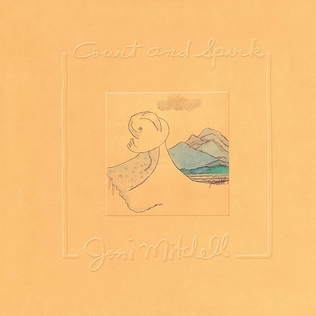
Blood on the Tracks is the 15th studio album by American singer-songwriter Bob Dylan, released on January 20, 1975 by Columbia Records. The album marked Dylan's return to Columbia Records after a two-album stint with Asylum Records. Dylan commenced recording the album in New York City in September 1974. In December, shortly before Columbia was due to release the record, Dylan abruptly re-recorded much of the material in a studio in Minneapolis. The final album contains five tracks from New York and five from Minneapolis.
Rush or rushes may refer to:

Steely Dan is an American rock band founded in 1972 by core members Walter Becker and Donald Fagen. Blending jazz, traditional pop, R&B, and sophisticated studio production with cryptic and ironic lyrics, the band enjoyed critical and commercial success starting from the early 1970s until breaking up in 1981. Throughout their career, the duo recorded with a revolving cast of session musicians, and in 1974 retired from live performances to become a studio-only band. Rolling Stone has called them "the perfect musical antiheroes for the Seventies".
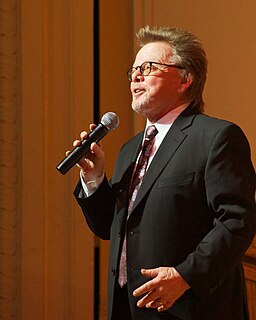
Paul Hamilton Williams Jr. is an American composer, singer, songwriter and actor. He is known for writing popular songs performed by a number of acts in the 1970s, including Three Dog Night's "An Old Fashioned Love Song" and "Out in the Country," Helen Reddy's "You and Me Against the World," David Bowie's "Fill Your Heart" and the Carpenters' "We've Only Just Begun" and "Rainy Days and Mondays." Williams is also known for his musical contributions to films, including the Academy Award-nominated song "Rainbow Connection" from The Muppet Movie, and penning the lyrics to the #1 chart-topping song "Evergreen," the love theme from the Barbra Streisand vehicle A Star Is Born, for which he won a Grammy for Song of the Year and an Academy Award for Best Original Song. He wrote the lyrics to the opening theme for the television show The Love Boat, with music previously composed by Charles Fox, which was originally sung by Jack Jones and, later, by Dionne Warwick.

Queen II is the second studio album by the British rock band Queen. It was recorded at Trident Studios and Langham 1 Studios, London, in August 1973 with co-producers Roy Thomas Baker and Robin Geoffrey Cable, and engineered by Mike Stone. It was released on 8 March 1974 by EMI Records at midnight in the UK and by Elektra Records in the US.
"Promised Land" is a song lyric written by Chuck Berry to the melody of "Wabash Cannonball", an American folk song. The song was first recorded in this version by Chuck Berry in 1964 for his album St. Louis to Liverpool. Released in December, 1964, it was Berry's first single issued following his prison term for a Mann Act conviction.

"I Honestly Love You" was a worldwide pop hit single for Olivia Newton-John in 1974. The song was Newton-John's first number-one single in the United States and Canada.

The Gap Band was an American R&B and funk band that rose to fame during the 1970s and 1980s. The band consisted of three brothers Charlie, Ronnie, and Robert Wilson; and it was named after streets in the historic Greenwood neighborhood in the brothers' hometown of Tulsa, Oklahoma. The group shortened its name to The Gap Band in 1973. After 43 years together, they retired in 2010.

"The Air That I Breathe" is a ballad written by Albert Hammond and Mike Hazlewood, initially recorded by Albert Hammond on his 1972 album It Never Rains in Southern California.
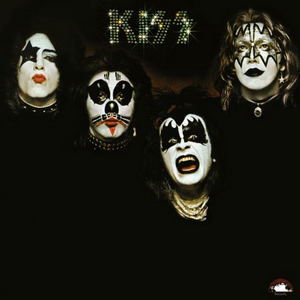
Kiss is the debut studio album by American rock band Kiss, released on February 8, 1974. Much of the material on the album was written by Gene Simmons and Paul Stanley, as members of their pre-Kiss band Wicked Lester. Simmons estimated that the entire process of recording and mixing took three weeks, while co-producer Richie Wise has stated it took just 13 days.

"Waterloo" is the first single from the Swedish pop group ABBA's second album, Waterloo and their first under the Epic and Atlantic labels. This was also the first single to be credited to the group performing under the name ABBA.

"Help Me" is a love song written, produced, and performed by Joni Mitchell, from her 1974 album Court and Spark. The song was recorded with jazz band Tom Scott's L.A. Express as the backing band. "Help Me" was Mitchell's biggest hit single: it peaked at #7 in June 1974 on the Billboard Hot 100, her only top 10 hit; it hit #1 on the easy listening chart.

"The Way We Were" is a song recorded by American vocalist Barbra Streisand for her fifteenth studio album, The Way We Were (1974). It was physically released as the record's lead single on September 27, 1973 through Columbia Records. The 7" single was distributed in two different formats, with the standard edition featuring B-side track "What Are You Doing the Rest of Your Life?" and the Mexico release including an instrumental B-side instead. The recording was written by Alan Bergman, Marilyn Bergman and Marvin Hamlisch, while production was solely handled by Marty Paich. "The Way We Were" was specifically produced for the record, in addition to three other tracks, including her then-upcoming single "All in Love Is Fair" (1974).
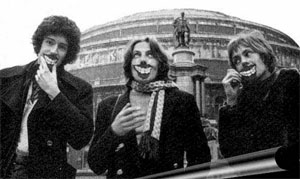
Smile were an English rock band based in London, best known as the predecessor to renowned rock band Queen. The band was formed in 1968 by Brian May, who went on to become Queen's guitarist. It included Tim Staffell as lead singer and bass guitarist, and later, drummer Roger Taylor, who also went on to play for Queen. They recorded only six songs and disbanded in 1970. These songs were titled “April Lady”, “Step on Me”, “Polar Bear”, “Earth”, “Blag”, and a song later re-recorded by Queen for the Queen album of 1973, “Doin’ Alright”. These songs exist on vinyl on the LP Ghost of a Smile. "April Lady" was dedicated to Roger Taylor’s girlfriend at the time.

"Jolene" is a song written and performed by American country music artist Dolly Parton. It was released in October 1973 as the first single and title track from her album of the same name, produced by Bob Ferguson.
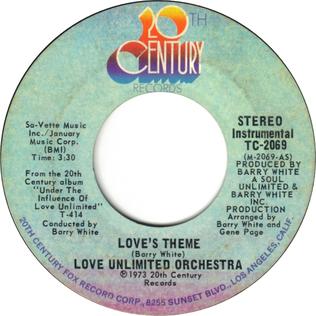
"Love's Theme" is an instrumental piece written by Barry White and recorded by Barry White's the Love Unlimited Orchestra and released in 1973 as a single. It is one of the few instrumental and purely orchestral singles to reach #1 on the Billboard Hot 100 chart in the United States, which it did in early 1974. Billboard ranked it as the #3 song for 1974. The piece was included on two albums: 1973's Under the Influence of... Love Unlimited and 1974's Rhapsody in White by the Love Unlimited Orchestra.

"Don't Let the Sun Go Down on Me" is a song written by English singer Elton John and his lyricist Bernie Taupin. It was originally recorded in 1974 by Elton John for his studio album Caribou and was released as a single that peaked at number two on the Billboard Hot 100 chart and reached number 16 on the UK Singles Chart. The song found further success in 1991 in a live cover version recorded as a duet between John and George Michael, which reached number one in the UK and US.
"Loving Arms" is a song written by Tom Jans and first recorded and released by Kris Kristofferson and Rita Coolidge as a duet in 1973.

The Way We Were: Original Soundtrack Recording is the soundtrack album to the film of the same name by American singer Barbra Streisand. It was released by Columbia Records on January 1, 1974. The soundtrack comprises twelve songs, mostly written by Marvin Hamlisch, three of which are different versions of "The Way We Were". The album was mostly produced by Fred Salem, with the exception of the title track which was produced by Marty Paich. Hamlisch and Salem collaborated to create five new songs for the soundtrack, while the remaining ones are cover songs.
